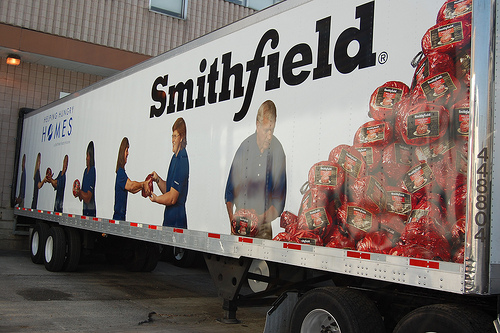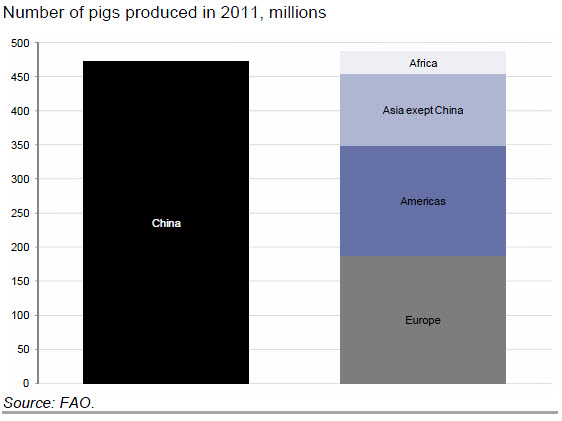Flashback:

Remember the 16,000 dead pigs found in Shanghai’s Huangpu river?
– China Pulls 1,000 Dead DUCKS From Sichuan River:
The news comes as the toll of dead pigs pulled from Shanghai’s Huangpu river passed 16,000.
So the conditions under which our food is produced …
@Amazon.com: Eating Animals
… will certainly not improve.
Bon appétit!
– China’s Shuanghui to Buy Smithfield Foods (Wall Street Journal, May 29, 2013):
Chinese meat producer Shuanghui Group agreed to acquire Smithfield Foods Inc. for about $4.7 billion, striking what would be the largest takeover of a U.S. company by a Chinese buyer—should it get past what is likely to be heavy regulatory scrutiny.
Shuanghui agreed to pay $34 per share for Smithfield, the world’s largest hog farmer and pork processor, marking a 31% premium to Smithfield’s Tuesday closing price of $25.97. Including debt, the deal values Smithfield at $7.1 billion.
Smithfield owns an array of household names, including Armour, Farmland and Healthy Ones, and is sold in 12 countries, according to its website. The company’s shares soared 33% to $34.50 in pre-market trading after The Wall Street Journal reported the potential deal.
The deal comes on the heels of agitation from a large Smithfield shareholder, Continental Grain Co., to split the company up.
The move by Shuanghui, a company also known as Shineway, would be the biggest takeover of a U.S. company by a Chinese company, according to data compiled by Dealogic, regardless of whether the debt is included in the value. That makes it a landmark development in China’s effort to expand beyond its shores as its vast economy booms.
But the country and its companies have often been thwarted in their quest to strike foreign takeover deals in the past—most notably oil company Cnooc Ltd.’s effort in 2005 to buy Unocal Corp. for $18.5 billion—amid fears that they could jeopardize U.S. national security.
Food-security issues could also complicate matter, in light of recent cases of contamination of Chinese meat supply from a bird-flu outbreak there. In the press release confirming the deal, the companies stressed they would “retain world-leading food safety and quality control standards.”
The deal is subject to review by the Committee on Foreign Investment in the United States, the companies said Wednesday. Indeed, the Smithfield, Va.-based company’s board of directors insisted that the deal be structured with a reverse breakup fee that would trigger a payment from the Chinese firm to Smithfield in the event that it falls apart due to regulatory issues, a person familiar with the deal said.
Founded in 1936, Smithfield had a market capitalization of $3.6 billion as of Tuesday’s close.
Shuanghui International Holdings Ltd., based in Henan province in central China, is the majority shareholder of China’s largest meat processor, Henan Shuanghui Investment & Development Co., which is publicly listed in the Chinese city of Shenzhen. Shuanghui sells products under the English name Shineway.
Under Chief Executive Larry Pope, Smithfield has expanded its packaged-meats brands, such as Eckrich sausage and Smithfield bacon, to garner higher profit margins. The company has long been a big player in selling hams and other fresh pork products for grocers’ meat cases, but those meats—often sold under the grocer’s brand—carry lower profit margins than packaged, branded meats.
Smithfield has ratcheted up its spending on advertising to become a bigger player in packaged meats, where it lacks the national brand recognition of rivals like Hillshire Brands Co. and Hormel Foods Corp. The company’s pork brands largely have a regional following.
Smithfield notched a marketing deal in 2011 with auto-racing legend Richard Petty’s Nascar team, and Mr. Pope said the arrangement fits nicely with his company’s products because many male racing fans are the type of men who like its hot dogs and bacon.
But the company stumbled in 2008 and 2009, suffering rare losses, as its hog farms faced a big run-up in grain costs as the burgeoning U.S. ethanol industry led to higher prices for corn. Smithfield also faced an industry wide glut of hogs, pressuring prices for pork. Smithfield’s shares tumbled to below $6 a share and it had to raise new capital, including selling a 5% stake to Chinese state-owned food company Cofco Ltd.
During part of that period, when some analysts feared the company would file for bankruptcy, Mr. Pope said in a 2012 interview, he slept so little that his doctor had to prescribe sleeping medication. “He told me, ‘Larry, I’ve got to get you to sleep or you’re going to have a heart attack.”
Lately, shareholders pressured the company for change. Continental Grain, which together with several related parties recently owned roughly 6% of Smithfield, has urged the pork company to consider splitting itself up.
Continental has criticized Smithfield’s share performance under Mr. Pope. Continental has said the board should consider separating into three businesses: hog production, fresh pork and packaged-meats production, and international pork operations.
Continental has also said Smithfield should initiate a regular cash dividend and should add several directors to its board with strong backgrounds in agribusiness and branded consumer packaged goods.
Mr. Pope, a longtime Smithfield executive, became CEO in 2006, filling the shoes of the company’s longtime leader, Joseph Luter III, who was the architect of its strategy to become vertically integrated, snapping up hog farms along its pork-processing plants. Under Mr. Luter, the company’s shares soared over three decades.
ZeroHedge: Confused why China wants pork? Simple: the meat is the primary food in the country, the biggest source of marginal food inflation, and is produced more in China than in the entire rest of the world.
Recommended book:



Well, I don’t eat pork in any case. If it is from China, I am boycotting it.